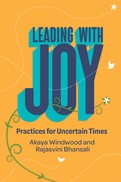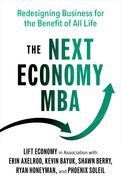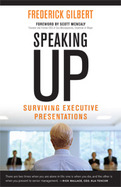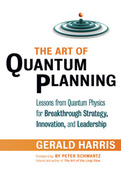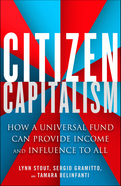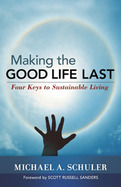2022
Leadership that connects people and centers compassion and trust instead of competition and disconnection is needed more than ever before. There are plenty of manuals that show people how to manage organizations, but what is really needed in this moment is a book that shows us how to include kindness and inspiration within leadership. Leading with Joy promotes a courageous and compassionate approach to leadership that can sustain purposeful action and social change.
This book takes the form of a series of vignettes about the authors' insights and stories, with reflection questions at the end of each one. Through these stories-which address topics such as workplace triumphs and lessons, family relationships, and even near-death experiences- Akaya Windwood and Rajasvini Bhansali illuminate different aspects of leadership, such as humility, forgiveness, and kindness, and invite leaders to respond to the current moment.
The book draws on the authors' lived experiences as leaders, including their encounters with oppression, and their wisdom in principled leadership. They demonstrate how leaders can create conditions of abundance and well-being, which are necessary for long-term social transformation.
2023
Many current and aspiring entrepreneurs are looking for a solid business education that also deeply aligns with their progressive values. Based on a course field-tested with over 500 students, this book fills that gap. It covers traditional topics such as business strategy and structure, finance, marketing, recruiting, and branding from a socially just and environmentally regenerative perspective. And it also touches on topics such as strategies to reverse climate change, nonviolent communication, self-managing organizations, locally self-reliant economies, racial justice, and more.
Traditional MBA programs are based on outdated principles that were developed during the Industrial Revolution-and they can be hugely expensive. Sustainable MBA programs, while laudable, are too incremental to make a sufficient impact. The Next Economy MBA is for entrepreneurs seeking to make business an active force for good. It draws on the authors' experience of working with over 300 social enterprises, from small organizations like Winona's Hemp and Heritage Farm to household names like Ben & Jerry's and Patagonia.
Our current economy, what the authors call the Business as Usual Economy, has created a massive wealth gap, a climate crisis, racial division, and needless housing, food, and healthcare shortages. This book shows how businesses can pave the way to a Next Economy that meets the basic needs of all people and restores and protects the planetary ecosystem.
2013
- The first book to focus on presenting to senior managementpeople with very specific expectations and requirements and the power to make or break careers
- Draws on interviews with more than fifty C-level executives
- Includes nine chapters containing QR codes for free videos on the chapter topics
- Click here for the press release
There are two times when youre alone in life: one is when you die, and the other is when you present to senior management.
Rick Wallace, CEO, KLA-Tencor
If you are in middle management, you live with daily ambiguity, lack of control, and even chaos. To get anything done, you must present your ideas to decision makers, and those presentations can be brutal. Careers and projects can come unwound in a matter of minutes if a presenter at the top level doesnt know the rules.
Fear in the middle creates fog at the top, and bad decisions are made. The stakes are highone presentation can make or break a careerbut the rules are utterly unclear. Or at least they used to be.
Speaking Up is an indispensable resource for anyone who needs to know how to present to those higher up the chain. It offers revelatory insights into the minds of the men and women at the topinformation that is crucial to understanding what theyre looking for from presenters. Tactics and techniques that work well with peers, subordinates, and immediate supervisors may actually work against you when presenting up the chain.
Psychologist and coach Frederick Gilbert shows why these high-level presentations are about one thing: delivering information to help extremely talented, highly stressed people make good decisionsfast.
Gilbert focuses on three simple rules for speaking up: (1) know the people, (2) get to the point, and (3) improvise. Based on ten years of research and hundreds of interviews, Gilberts book is unique in featuring extensive comments from executives explaining exactly what they want and dont want in a presentation, as well as midlevel managers stories of triumphs and tragedies and what they learned as a result. This a must-read book for surviving high-stakes meetings.
2019
This would happen through the creation of what the authors call the Universal Fund, a kind of national, democratic, mega mutual fund. Every American over eighteen would be entitled to a share and would participate in directing its share voting choices. Corporations and wealthy individuals would donate stocks, bonds, cash, or other assets to the fund just like they do to other philanthropic ventures now. The fund would pay out dividends to its citizen-shareholders that would grow as the fund grows.
The Universal Fund is undoubtedly a big idea, but it is also eminently practical: it uses the tools of capitalism, not government, to give all citizens a direct influence on corporate actions. It would be a major institutional investor beholden not to a small elite group of stockholders pushing for short-term gain but to everyone. The fund would reward corporations that made sure their actions didn't harm people, communities, and the environment, and it would enable them to invest in innovations that would take more than a few months to pay off. Which is another reason corporations would donate to the fund—they could be freed from the constant pressure to maximize their quarterly share price and would essentially be subsidized for doing good.
The authors demonstrate that our current economic rules force corporations to be shortsighted and even destructive because for most large investors, nothing matters but share price. The Universal Fund is designed to be a powerful positive balancing force, making the world a better place and the United States a better nation.
Shows that sustainability, a concept usually associated exclusively with environmentalism, is the key to a truly fulfilling personal life
Filled with practical advice as well as thoughtful reflections
Illustrated with stories of Schuler's own efforts not always successful to live a sustainable life, as well as insights from science, literature, and a range of spiritual traditions
So many of us are beset by anxiety, depression, loneliness, and spiritual malaise, tense and unhappy despite our gadgets and goodies. Michael Schuler, leader of the nation's largest Unitarian Universalist congregation, says it's because, urged on by an aggressively materialist culture, we too often opt for short-term gratification and long-term denial. In this thoughtful and deeply honest book, he helps us find a life path that leads to treasures of perennial value: a beautiful and healthy earth home, enduring relationships, strong communities, work that contributes to the common good, and play that restores our bodies and lifts our souls.
Deconstructing the assumption that consumption, stimulation, and constant motion comprise the good life, Schuler urges the wholesale embrace of sustainability as both an operational principle and a life-sustaining core value. His book presents sustainability as a coherent frame of reference that can ground us spiritually, heal us internally, and deepen our relationships. Schuler identifies four behavioral principles for living sustainably Pay Attention, Stay Put, Exercise Patience, and Practice Prudence and shows how to apply them in our daily lives. He uses stories from his own life to illuminate the rewards and challenges of sustainable living and shares insights from environmentalists, social commentators, writers, poets, businesspeople, and spiritual leaders.
Sustainability means more than mere survival for individuals, just as for natural and social systems, it's the key to thriving rather than burning out. For those seeking a more profoundly satisfying way of life, Schuler's heartfelt explorations offer a counter intuitive answer: the sustainable life is the good life.


